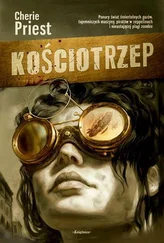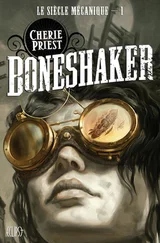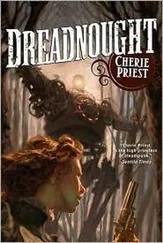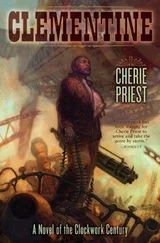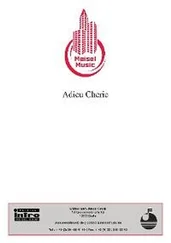He found it virtually impossible to pretend to the niceties that served as social lubricant for the masses. He did not like all the runaround and flowery difficulty that accompanied even the simplest transactions. Why couldn’t everyone just say what they meant? Why did they need to couch everything so cautiously? The truth should always be enough, regardless of its delivery.
He stamped his feet while he walked, as the chill worked its way through the soles of his shoes. His socks were thick and warm, but they were damp with mud and melted ice, and now he carried the slush of the streets along for the ride.
He considered catching a cab, but to where? Back to the Lincolns’ home, where he lurked in unhappy hiding? How could he rest under the ostensible guard of Nelson Wellers, a man who looked too fragile to wind a watch? He needed to stretch his legs. He needed to stretch his brain.
Abraham Lincoln was not wrong. But at the moment, he wasn’t interested in the president’s help. It wasn’t that he didn’t value the assistance and patronage; far from it. But there was some gap, some disconnect between them that occasionally could not be traversed. It might’ve been as simple as money, except that Lincoln had grown up poor as well … though not enslaved. It could’ve been as complicated as power, but were those two things different? Money and power? Gideon thought so, but he would have been the first to admit that the line between the two was thinner than D.C.’s icy air, and the overlap between them could not be overstated.
In simple fact, they did not always understand each other. And while Lincoln was a great speaker, a great writer, a great orator, even … he wasn’t the man whose audience Gideon craved right then.
And just like that, he knew where he wanted to go.
He hailed a cab after all, climbed inside, and gave directions to a townhome on the other side of the Capitol.
On the way, he stared out the window and watched the city churn, slipping across the ice and pushing through the weather to run the daily errands that would only become more difficult as winter established itself in earnest. He was glad that it wasn’t any worse, not yet. Not while he needed to come and go, and while the carriages pulled by horses, or driven by diesel engines, had to chain up their wheels and trudge through the streets like everyone else.
The carriage took him all the way over the Anacostia River, through some wooded, then swampy acreage, and up to a house called Cedar Hill. It left him at a curb that had been swept clean of ice and snow. Up a spate of stacked stone stairs he climbed, stopping at a door painted a tasteful shade of red. He gave the brass knocker a couple of good gongs and shifted his weight from foot to foot while he waited for an answer.
It arrived momentarily, when the door was opened by a teenage colored girl in the plain domestic outfit of a maid. “Can I help you?” she asked.
She was new. “I’m here to see Mr. Douglass.”
“Do you have an appointment?”
“Tell him Dr. Bardsley is here to see him, and if he leaves me standing on the stoop for too much longer, I’m likely to be shot.”
The girl’s eyes widened in alarm. “Shot?”
“Stabbed. Poisoned. The possibilities are endless. This having been established, I need a word with your employer.”
But she was stubborn, and perhaps not completely stupid. “I’m sorry if that’s true, about someone wanting to shoot you, but you’ll have to wait here. I’ll try to ask quickly. I’d rather nobody shot you on the stoop,” she confessed, and she closed the door.
It’d been an overstatement on Gideon’s part, or so he’d assumed when he said it. But now, in the silence between asking admission and receiving it, he second-guessed himself. They’d come for him at the Jefferson building, hadn’t they? Why wouldn’t they follow him, hunt him to someplace less conspicuous than the Capitol, or the home of a beloved former president?
He eyed the passing pedestrians, wondering who was safe, and who might be watching him … closing in on him. It wasn’t like him to be paranoid, but then again, it wasn’t like him to have murderers on his trail. Not specialized murderers, anyway. Bloodhounds were a generic lot entirely, and he could scarcely bring himself to count them.
In another half-minute, the door opened again. The girl said, “You can come inside. Mr. Douglass will be with you shortly. Let me take your coat, and—”
“No,” he said. “I’ll keep the coat.”
“As you like.” She nodded. “But come this way, and I’ll make you a cup of tea.”
“I’d rather have coffee.”
“I’ll … I’ll see what I can find.”
The parlor was a warm, intelligent place, lined with shelves covered in books, most of which were well loved and well read. A fire burned in the hearth, and two pairs of shoes were drying before it, propped up with their soles facing the flames. Gideon pulled up a chair and aimed himself toward the heat.
From the columned entryway to the home’s main wing, a voice asked, “So what’s this about you getting shot, or stabbed, or poisoned?”
Gideon rose from the chair. “Anything’s possible.”
“But is it likely ?” asked Frederick Douglass, a handsome, graying negro in his early sixties. His shirtsleeves were rolled up, and his waistcoat held a small notebook with a pencil strapped against it. He wore a nice pair of house slippers, and a set of reading spectacles pushed up over his forehead.
The men shook hands, and retreated to the warmest seats in the room. Gideon again cocked his feet toward the fire and finally answered, “It’s hard to say. They started with guns and dynamite, and neither one worked out for them. I can only assume they’ll move on to something more subtle next. Knives or potions.”
“They could always go the opposite way, and reach for larger guns.”
“Maybe,” Gideon agreed. “But I suspect that I’ve been targeted by someone more cautious and cunning. Brute force isn’t her style, unless she’s playing political games.”
“And that’s not what you’re caught up in? A political game?”
Now that someone else said it aloud, it was silly to insist otherwise. “All right, then it’s a political game. There’s always the chance that I’m wrong, so let’s call it a hunch and hope for the best.”
Douglass said, “I’d like to think that the ‘best’ would imply that you were destined for a long, happy life, with no interference from dynamite or politics. What’s going on, Gideon? What can I do for you? It’s been … oh, six months since I saw you last. Should I assume you’ve had your nose buried in that Fiddlehead project all this time?”
“Yes. And the Fiddlehead is why they want me dead.”
“On that ominous note…” Douglass raised a finger to indicate that the maid had returned with coffee for Gideon, and tea for her employer. He told her to leave the tray behind, so that they could serve themselves at their leisure. When she was gone he selected two cubes of sugar, and took up the question he’d left dangling before her arrival. “Now, why don’t you tell me who ‘they’ are. The mysterious ‘they,’ who you’ve used a feminine pronoun to describe—so I am terribly curious, if you don’t mind me saying so.”
Over the next half hour, Gideon told him everything, starting with Abraham Lincoln and the Confederate spy Belle Boyd working for the Pinkertons, and moving right along to the Fiddlehead’s conclusions, Katharine Haymes, and the tenuous connection between her company’s war crimes and the walking plague. It felt good to lay it out on the table, even if the table wasn’t his own, and didn’t belong to his usual benefactor. If anything, being forced to tell it all from start to finish, to someone who hadn’t heard it yet and wasn’t familiar with all the details, gave his brain room to sort through the particulars and see the connections better himself.
Читать дальше

